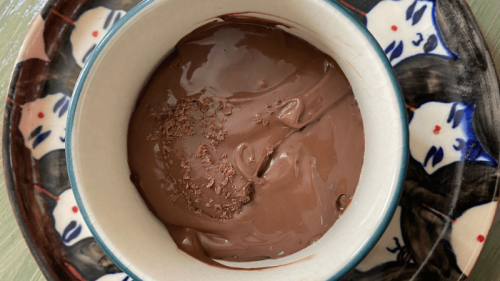Food Stories: Karhi

We all have our own unique love affair with karhi.
Ammi, Naani/Daadi or Khala/Phuppi; at least one of the five knows how to make the best karhi in every desi family, either side of the Wagah Border.
In our family, Anjum khala makes the best karhi every time we take a trip to her wonderful home in Faisalabad; or during any of her trips to Karachi, which necessarily involve at least one lavish and delicious night of a family get-together over karhi, chawal, shami kabab, kuchumbar (finely chopped onion, tomato, green chillie, cilantro salad in lemon juice), achaar and chutney.
Karhi is a gram flour (besan) and yogurt-based sauce with fritters or pakoras.
The Rajasthanis or Marawaris, Gujratis, Sindhis and Punjabis all have their unique styles of making karhi. All ethnicities differ a little in flavour and texture, but for the most part, the basic ingredients of the dish remain the same, pakora or sans pakora at times.
 |
Originally, though, karhi is a Rajasthani dish and its derivations by other ethnicities a happenstance of proximity and travel.
The cuisine of Rajasthan is greatly influenced by the arid land surrounding it, and the scarcity of water. The region is drought-ridden but its wonderfully rich heritage and vibrant people have learnt to adapt to their locale, helping evolve a dish that is a rich addition to the subcontinent's food delights.
In Rajasthan, since water is scarce, food is mostly milk, yogurt or ghee-based, lending it a deeply rich texture typical of Rajasthani cuisine. Water and fresh greens are usually substituted with dairy.
The Marwari cuisine is mostly vegetarian (sans fresh greens) and encompasses a colourful and rich variety of specialties. It is robust like its history, region and inhabitants. The desert gypsies of yesteryears helped in the evolution of this desert cuisine. Food that lasted for several days and could be eaten without heating was a preference.
 |
In the deserts of Rajasthan, the use of lentils, gram flour and beans obtained from native plants were used extensively for cooking, so the evolution of karhi had to happen. The neighbouring states of Punjab, Gujarat and Haryana borrowed the besan karhi pakora from Rajasthani and gave it a flavour of their own.
Punjabi karhi is thicker (sans jaggery), and potatoes and spinach are commonly dipped in the pakora batter, as are onions in the yogurt base; while Gujarati karhi is usually sans pakoras. Needless to say, all variations are delicious and are commonly enjoyed with boiled rice.
 |
While we mostly associate curry with hot and spicy peppers, the original sub-continental curry did not have any peppers in it since chili peppers or red peppers are not native to the region.
James Trager, in his book titled, The Enriched, Fortified, Concentrated, Country-Fresh, Lip-smacking, Finger-licking, International, Unexpurgated Foodbook writes the following;
"The seasoning habits of the fifth-century BC civilisation known as the Mohenjo Daro used mortars and pestles to pound the sun-dried seeds of mustard, fennel and most especially cumin and the rinds of tamarind pods to create the earliest curry powder."
Food historian K. T Achaya opines:
"The word Kari is from the south Indian language of Tamil and was widely in use by 1500 B.C., if not earlier.
"Some also believe that the yogurt-based Karhi is from Northwestern India and is a precursor to what came to be known as the British curry. The British were exposed to this saucy dish much earlier than to the foods of the south; they had entered India in the early 1600s through the northwestern city of Surat, making kadhi quite possibly the original curry."
 |
When it was time for me to make the original curry, I used Anjum Khala’s recipe, a Punjabi family recipe dating back to the mid-19th century. My taste-tester exclaimed, "Mom, this is the best karhi I’ve ever had."
Here it is, from my kitchen to yours.
Punjabi Karhi
Ingredients 1 (for the yogurt base)
1 kg. yogurt (beat with water, 2 to 3 glasses to make consistency thin)
1 cup gram flour, mix with 1 to 2 cups water and beat well ensuring a smooth thin consistency, add to yogurt through sieve, and mix well)
2 medium onion, diced
1 tsp. ginger
1 tsp. garlic
1½ tsp. turmeric
Salt to taste
1 tsp. red chillie powder
Ingredients 2 (for the pakoras)
1 cup gram flour
1 green chillie, chopped
4 tbsp. chopped spinach
1 medium sized potato, cut in small cubes
3 tbsp. chopped cilantro
Salt to taste
Red chillie powder to taste
½ tsp. Ajwain, ½ tsp. coriander seeds, 1 tsp. cumin seeds (pan roasted and roughly ground)
½ to 1 tsp. baking powder (level)
 |
Ingredients 3 (fried garnish/bhagar)
Oil
Sliced onions
Dried red chillie whole
Karhi leaves (optional)
 |
Method
Mix 'ingredients 1' and bring to boil, stirring all along. Cook for 3 to 3 ½ hours on medium heat, adding water as and when the yogurt karhi starts to thicken, maintaining a thin consistency. Keep stirring periodically to ensure consistency and avoiding formation of dough balls.
Mix 'ingredients 2', eyeballing water to form batter. Fry pakoras and mix to cooking yogurt, turning off heat. Pour bhagar, serve with a side of boiled rice.
 |
—Photos by author
Explore more food stories here.
Bisma Tirmizi is a former Dawn staffer, currently a freelance journalist.
She loves food, music and simple pleasures. She can be reached at bismatirmizi1@gmail.com. Follow her on Facebook here.













































